The $2 Billion Escape Plan That Beijing Didn't See Coming
Meta's $2B Manus deal triggered reviews by three Chinese agencies. The 'China shedding' playbook for AI startups faces its first test.

Good Morning from San Francisco,
Three stories capture AI's consolidation moment. Musk threatens Apple with antitrust action over alleged ChatGPT favoritism—claims without evidence, but timing matters. Beijing pressures Chinese firms to justify Nvidia chip orders just days after Trump's revenue-sharing deal. Microsoft dissolves GitHub's CEO role entirely, absorbing the platform into its AI organization.
Platforms choose winners through partnerships and algorithms. Governments shape markets through regulatory pressure. Integration replaces independence as AI tools mature from experiments to infrastructure.
Each story shows the same dynamic: strategic control trumping innovation freedom. The startup phase ends. The platform wars begin.
From Washington's view, it's managed competition. From Beijing's perspective, it's conditional access. From Silicon Valley's angle, it's inevitable consolidation.
Stay curious,
Marcus Schuler

Elon Musk said Monday his AI startup xAI would sue Apple for alleged antitrust violations, claiming the iPhone maker systematically prevents any AI company besides OpenAI from reaching top App Store rankings. The accusation came without supporting evidence.
Musk's complaint targets both algorithmic charts and editorial curation. ChatGPT currently leads the "Top Free Apps" section while Grok ranks fifth or sixth, depending on measurement timing. Apple partnered with OpenAI in June 2024 for system-level ChatGPT integration, creating structural advantages through device-level access rather than ranking manipulation.
From Musk's perspective, the pattern suggests coordinated exclusion. From Apple's view, the OpenAI partnership provides tested AI capabilities without competitive conflicts. Both readings fit the available evidence.
The threat arrives amid intensifying Apple antitrust scrutiny. A federal judge recently found the company violated court orders requiring greater App Store competition, while the EU imposed €500 million in fines for platform restrictions. Sam Altman deflected Musk's accusations by pointing to alleged X algorithm manipulation.
Why this matters:
• Mobile app stores increasingly determine consumer AI access, making platform curation decisions potential antitrust flashpoints
• The outcome signals how far dominant platforms can privilege partners without violating competition law


Prompt:
Suddenly

Beijing is asking Chinese companies to explain why they need Nvidia's H20 chips instead of domestic alternatives, creating political pressure around purchases just days after the Trump administration approved exports in exchange for 15% of revenues.
Chinese authorities sent notices to firms including Alibaba and ByteDance, requesting justifications for H20 orders through regulators like the Ministry of Industry and Information Technology. The guidance particularly discourages American chips for government-related work while leaving commercial applications in a regulatory gray zone.
The timing reveals coordinated pressure. Commerce Department licenses began flowing August 8th; Chinese notices arrived shortly after. Washington's unprecedented arrangement requires Nvidia and AMD to share revenues for market access—a "conditional access" model that converts security policy into government income. Beijing responds with "regulatory discouragement" that shapes procurement without formal bans.
The equilibrium is unstable but functional. Nvidia's China market share already dropped from 95% to 50% over four years, with analysts expecting further decline to the mid-50s in 2025. Losing H20 access would increase AI inference costs for Chinese companies by three to six times, according to US estimates, explaining why Beijing pressures rather than prohibits.
Why this matters:
• Regulatory discouragement creates political liability around foreign tech purchases without triggering formal trade retaliation mechanisms
• Conditional export licensing establishes a template where strategic technology access requires both government revenue sharing and diplomatic choreography
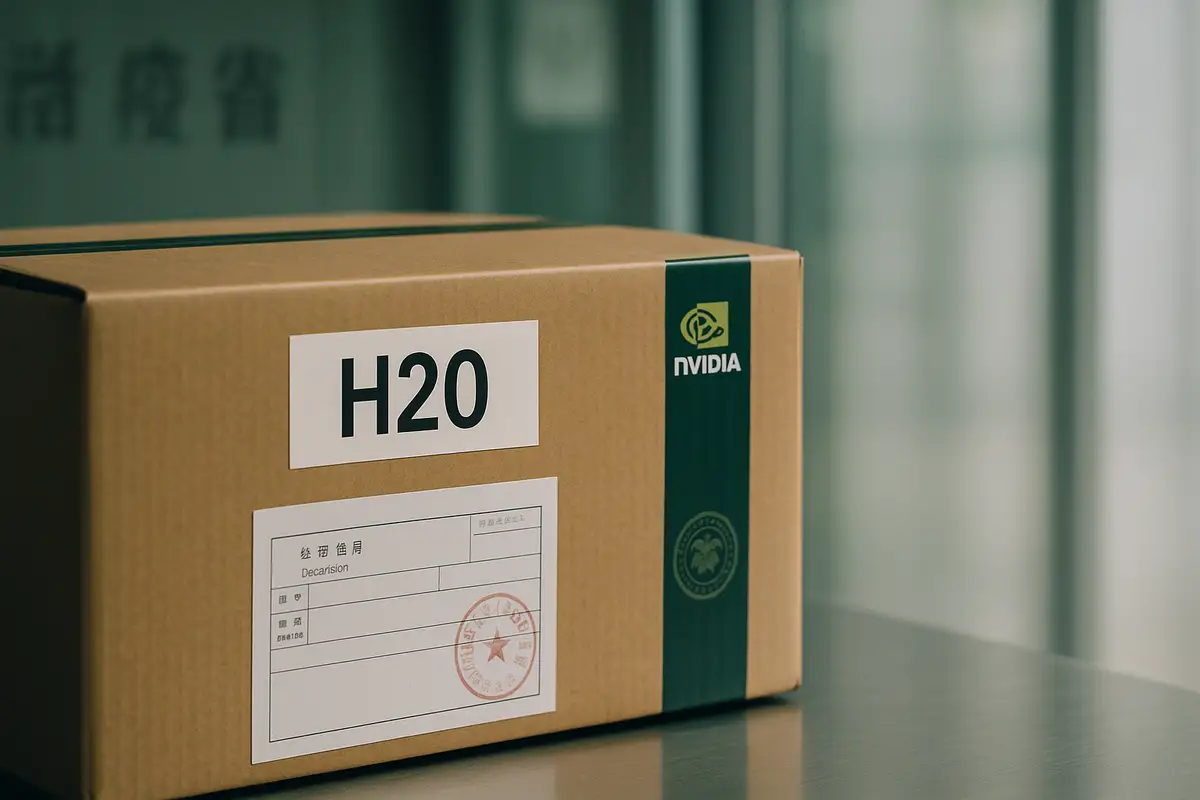
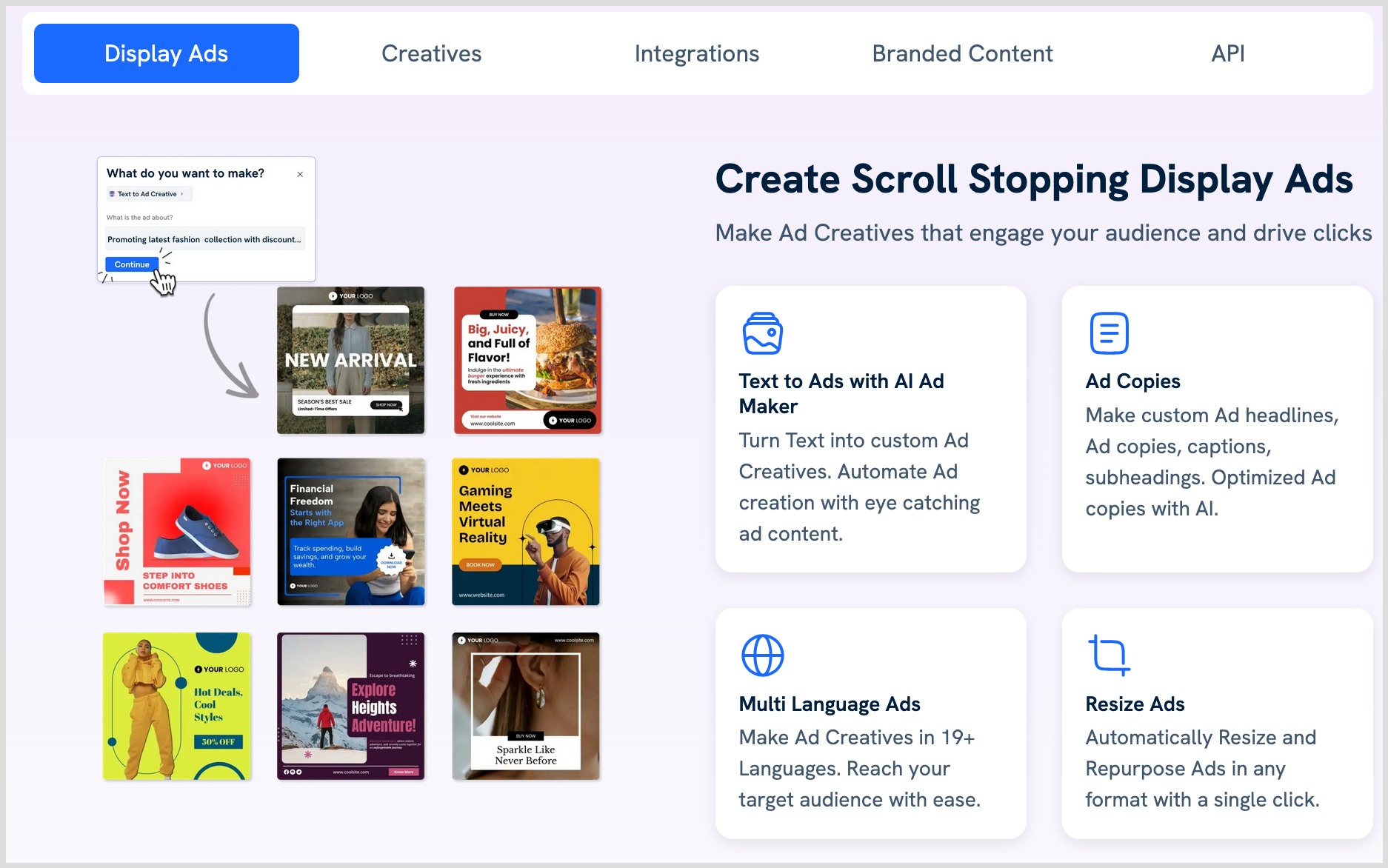
Predis.ai transforms simple text inputs into complete social media posts with custom visuals, captions, and hashtags. The platform generates branded content for all major social platforms while maintaining your brand voice and visual identity across posts, videos, and ads.
Tutorial:
URL: https://predis.ai/
Create a comprehensive, chronologically organized to-do list for planning a memorable birthday party for a 10-year-old child.
Requirements:
Deliverable: A actionable, step-by-step checklist that a parent or party planner can follow to ensure nothing is overlooked.
Anthropic will offer Claude to US lawmakers and federal agencies for $1 per branch following OpenAI's identical government pricing strategy announced Tuesday. The parallel moves signal how AI companies are prioritizing political influence over revenue as they compete for regulatory favor in Trump's Washington.
Trump called Intel CEO Lip-Bu Tan "highly CONFLICTED" and demanded his resignation four days ago over China ties, then met with him Monday and announced cabinet members would work with Tan on suggestions for the coming week. The whiplash reversal shows how direct White House access can instantly override public criticism, leaving other executives facing similar scrutiny to wonder whether Trump's initial positions reflect firm convictions or preliminary judgments.
Reddit will block the Internet Archive's Wayback Machine from indexing most Reddit content starting today, allowing only homepage archiving after discovering AI companies were scraping Reddit data from the archived pages. The move shows how platforms are turning digital preservation tools into collateral damage in their fight to monetize AI training data.
AMD CEO Lisa Su dismissed timeline questions about when her company might challenge Nvidia's $4.4 trillion AI dominance, telling WIRED that AMD's 10-year turnaround from $2 billion to $300 billion market cap proves patience pays off in semiconductors. Su's strategic restraint signals how established chipmakers plan to compete not through dramatic announcements but through sustained technical execution while navigating an increasingly politicized global market.
Nvidia unveiled Cosmos Reason, a 7-billion-parameter vision language model that helps robots plan actions and understand physics, alongside new simulation tools and servers for robotics developers at Monday's SIGGRAPH conference. The launch signals Nvidia's push beyond AI data centers into physical robotics applications as the company searches for the next major use case for its GPUs.
Australia's federal court ruled that Apple and Google misused their app marketplace dominance and 30% commission fees to reduce competition, prompting Epic to announce Fortnite's return to iPhones via the Epic Games Store. The decision shows how Epic's global legal strategy produces different outcomes across jurisdictions, with Australia siding against both tech giants while US courts largely favored Apple.
Larry Ellison announced he's "amending" his 2010 Giving Pledge commitment to donate 95% of his $300 billion fortune, instead channeling resources toward for-profit companies tackling global problems through his £1 billion Ellison Institute of Technology at Oxford. The shift follows a Silicon Valley pattern away from Gates Foundation-style nonprofits toward market-driven approaches that maintain founder control while redefining charitable obligations as commercial investments.
Meta, Google and Apple pledged $4.5 billion in 2019 to build affordable housing in Silicon Valley, but six years later most projects remain stalled in permitting while companies have spent only a fraction of committed funds. The delays show how local land-use rules can neutralize even billion-dollar corporate commitments, with California's regulatory maze proving harder to navigate than the companies anticipated.
IBM published a quantum computer blueprint in June while Google cleared a major scaling hurdle late last year, with both companies now claiming they can build industrial-scale quantum machines by 2030. The breakthroughs mark a shift from solving fundamental physics problems to tackling engineering challenges like scaling from 200 qubits to over 1 million while controlling noise and manufacturing costs.
Circle unveiled Arc, a Layer 1 blockchain using USDC as native gas, three months after its $1.2 billion public debut and alongside Q2 revenue growth of 53% to $658 million. The move transforms the second-largest stablecoin issuer from payment processor to platform owner, following market leader Tether's strategy of supporting dedicated blockchain infrastructure through projects like Stable and Plasma.
Notion CEO Ivan Zhao says the company will soon let users create specialized AI "teammates" that can handle different knowledge work tasks, from taking meeting notes to managing projects, as part of a shift from providing tools to providing AI that does actual work. The move shows how productivity software companies are racing to offer AI employees rather than just AI-enhanced apps, betting that businesses want digital workers who can complete tasks independently.
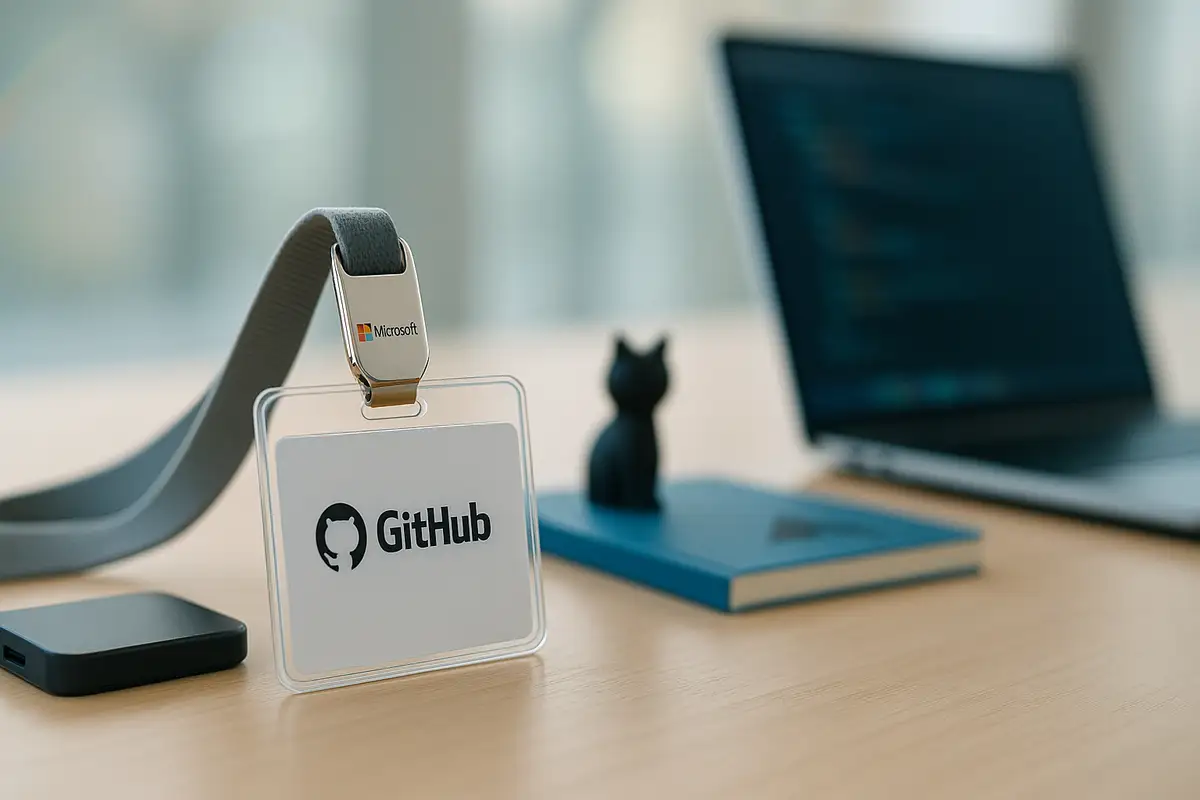
GitHub CEO Thomas Dohmke announced Monday he's stepping down to return to startup life, with Microsoft dissolving the standalone CEO role entirely.
The platform now reports directly into Microsoft's CoreAI organization through distributed leadership—developer division head Julia Liuson overseeing revenue and engineering, chief product officer Mario Rodriguez reporting to AI platform leadership.
The timing reveals Microsoft's calculation. GitHub delivers peak performance: 1 billion repositories, 150 million developers, 20 million Copilot users generating billions in revenue. The transformation from code repository to AI-powered development platform is complete. Independence served its purpose during the uncertain early days of generative AI. Now Microsoft wants coordination over autonomy.
The pattern fits broader industry dynamics. As AI development tools mature from innovation experiments to essential infrastructure, platform control trumps brand independence. Google, Amazon, and Microsoft are each building integrated ecosystems spanning code development to cloud deployment. The startup phase is over; the platform wars have begun.
Why this matters:
• Platform consolidation in AI tools mirrors broader tech concentration, with strategic control replacing innovation independence as markets mature
• Microsoft's "acquire, prove, absorb" approach provides a template for how major platforms will handle AI-era acquisitions going forward
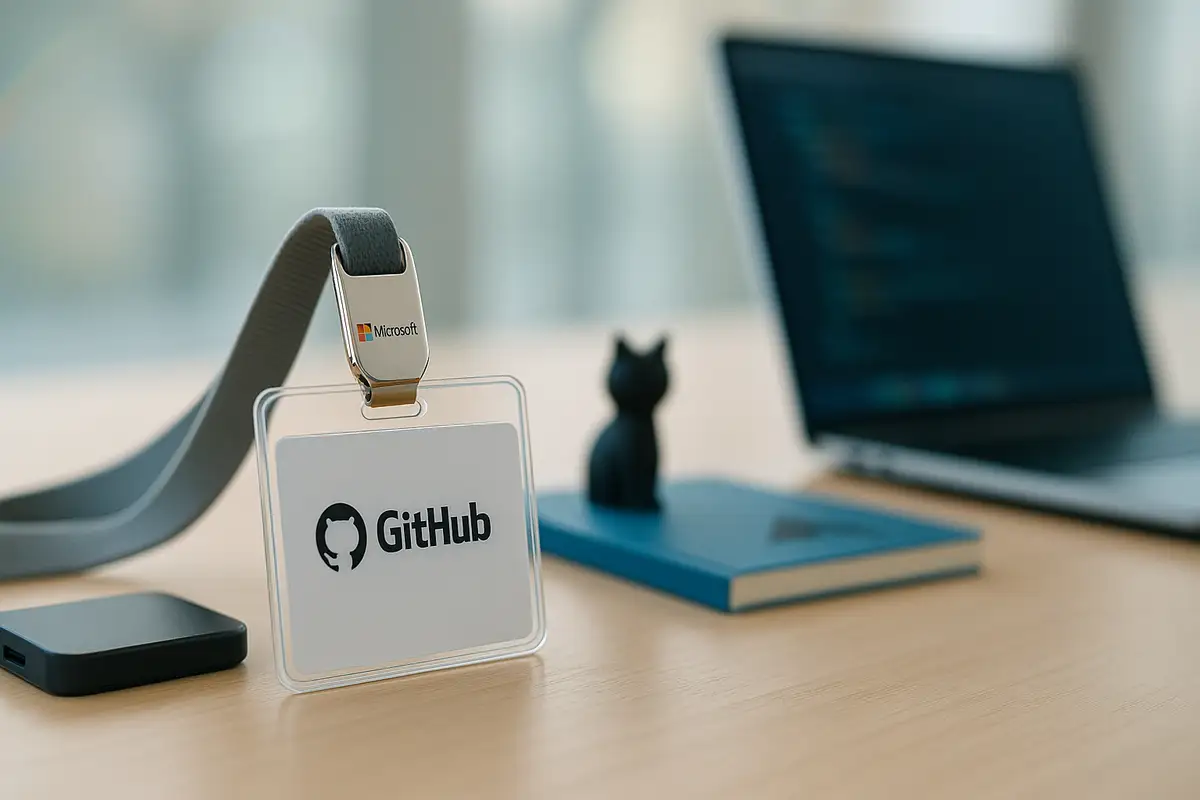
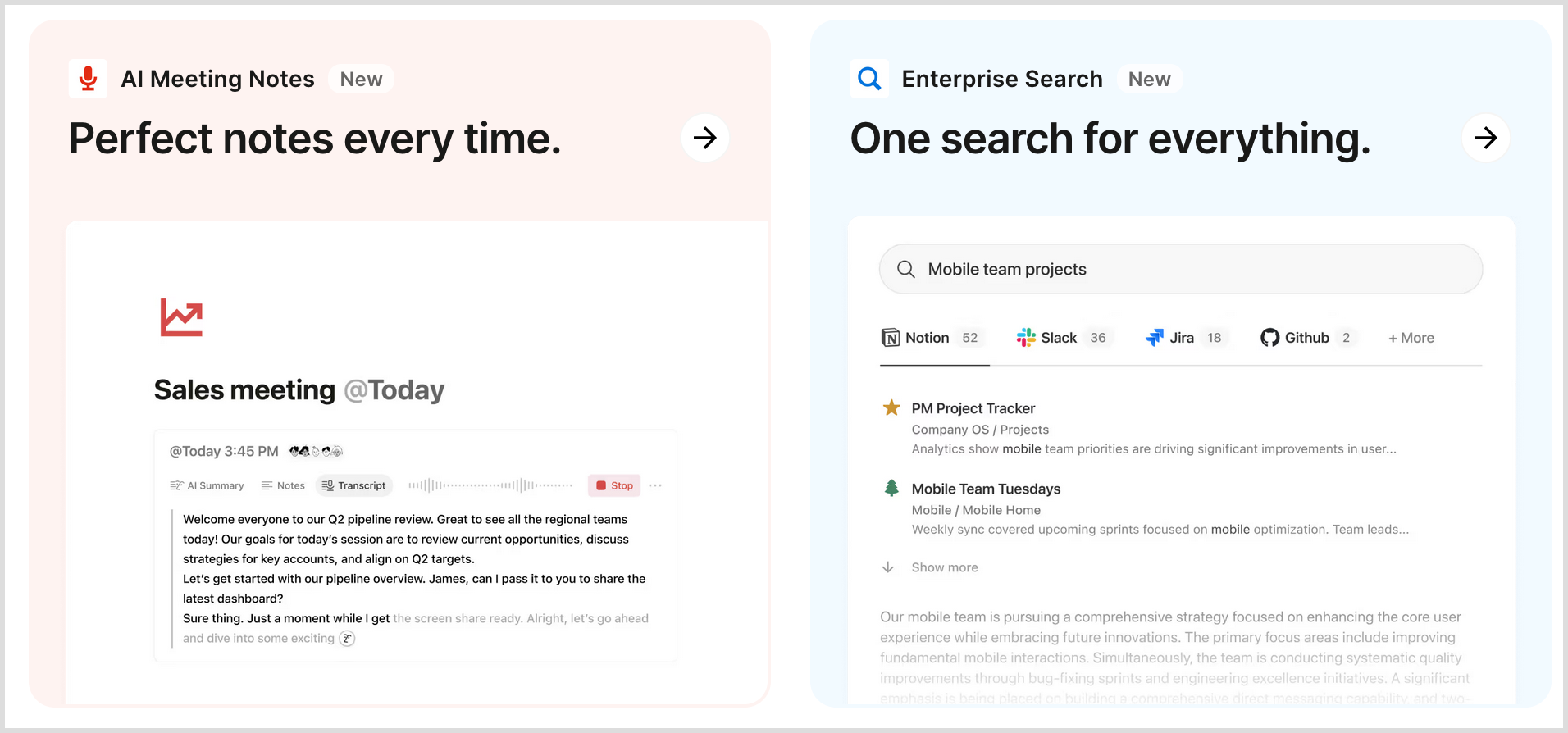
Notion solved workspace fragmentation through modular consolidation—turning scattered productivity tools into a unified, customizable platform. The company's strategic patience paid off: a profitable $10 billion business built on design principles, not venture hype.
The Founders
Founded 2013 by Ivan Zhao and Simon Last in San Francisco, then strategically rebuilt in Kyoto, Japan after initial failure. The geographic reset enabled product focus. Now 400+ employees generating sustainable revenue—rare in productivity software's cash-burning landscape.
The Product
Block-based workspace architecture combining databases, wikis, task management, and AI capabilities. Core strength: infinite customization without complexity penalty. Notion AI (2023), Calendar (2024), and Mail (2025) extend the platform's consolidation strategy. Handles everything from personal knowledge management to enterprise CRM deployment.
The Competition
Microsoft and Google dominate enterprise suites but lack flexibility. Point solutions like Airtable excel at databases, Asana at project management—both miss integration. Obsidian and Capacities target personal knowledge management but ignore team workflows. Notion occupies the strategic middle: structured enough for enterprises, flexible enough for power users.
Financing
$350 million raised across multiple rounds, including $275 million Series C at $10 billion valuation (October 2021). Profitable since then—unusual discipline in venture-funded productivity software. Investors include Coatue, Sequoia, Index Ventures. The company's funding independence creates strategic optionality.
The Future ★★★★★
Notion captured the workspace consolidation trend precisely. AI teammate features could transform reactive productivity tools into proactive workflow orchestration. The Kyoto rebuild taught long-term thinking—now they're executing while competitors chase quarterly metrics. Positioning as knowledge work infrastructure, not just another productivity app, suggests sustainable competitive advantage.
Get the 5-minute Silicon Valley AI briefing, every weekday morning — free.